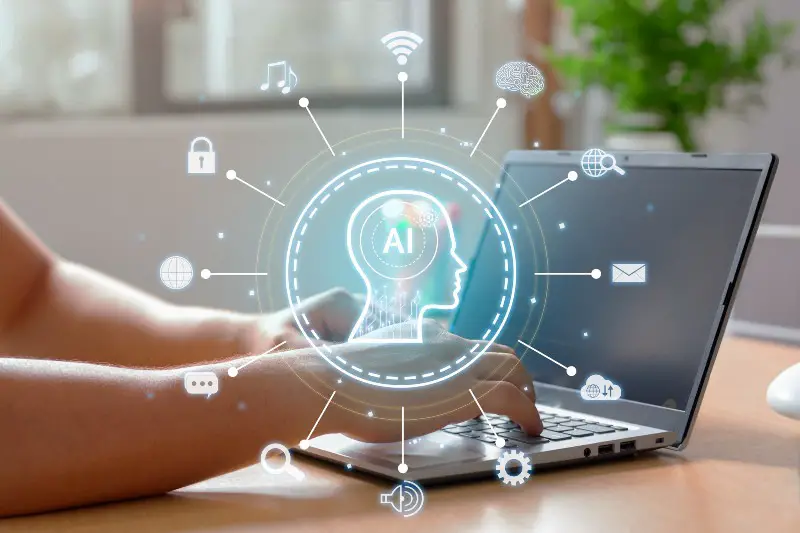Introduction
In the rapidly evolving world of technology, artificial intelligence (AI) has emerged as a groundbreaking force, particularly in the healthcare sector. For tech enthusiasts and professionals alike, the integration of AI through machine learning (ML) algorithms presents both exciting possibilities and significant challenges, especially in the realm of privacy and security. This post delves into the intricate relationship between AI and healthcare, exploring how machine learning is revolutionizing medical practices while also raising critical privacy concerns.
The healthcare industry’s adoption of AI is not just a futuristic concept but a present reality. From predictive analytics in patient care to automated diagnostics, AI’s potential to enhance healthcare outcomes is immense. However, this integration comes with the responsibility of handling sensitive patient data, making privacy and security paramount. As we navigate this complex landscape, understanding the myths, facts, and practical implications of AI in healthcare becomes crucial.
Healthcare and AI: A Tech Enthusiast’s Dream
For tech enthusiasts, the healthcare sector’s use of AI is a fascinating study in innovation and application. Machine learning algorithms are capable of processing vast amounts of data, identifying patterns, and making predictions with an accuracy that was previously unattainable. This capability has led to breakthroughs in early disease detection, personalized treatment plans, and even in the development of new pharmaceuticals. The precision and efficiency brought by AI in these areas are not just improving healthcare delivery but are also opening new avenues for tech-driven healthcare solutions.
However, the excitement is not without its challenges. The reliance on data-driven technologies raises questions about the ethical use of patient data. Ensuring that these AI systems are not only effective but also equitable and free from biases is a significant concern. As tech enthusiasts, it’s essential to advocate for transparent and responsible AI systems that prioritize patient welfare and data integrity.
Machine Learning in Healthcare: Transforming Patient Care
Machine learning, a subset of AI, is particularly transformative in healthcare. By learning from historical health data, ML algorithms can predict patient outcomes, assist in diagnosis, and even recommend treatment options. This level of personalized care was unimaginable a few decades ago. For instance, ML algorithms can analyze radiology images faster and often more accurately than human radiologists, leading to quicker diagnosis and treatment.
The potential of ML in managing chronic diseases is also noteworthy. By continuously analyzing patient data, ML can help in monitoring disease progression and adjusting treatments accordingly. This proactive approach in chronic disease management could lead to better patient outcomes and reduced healthcare costs. However, the success of ML in healthcare hinges on the availability of high-quality, diverse datasets, which brings us to the critical aspect of data privacy and security.
Privacy and Security in AI-Driven Healthcare
The integration of AI in healthcare inevitably leads to concerns about patient data privacy and security. With machine learning algorithms requiring access to vast amounts of sensitive personal health information, ensuring data protection is paramount. The risk of data breaches, unauthorized access, and misuse of patient data is a significant concern that healthcare providers and AI developers must address.
Compliance with regulations like HIPAA in the United States and GDPR in Europe is crucial in safeguarding patient privacy. Moreover, developing AI systems with built-in privacy measures, such as data anonymization and secure data storage and transmission protocols, is essential. Educating healthcare professionals and patients about data privacy and security is also vital in building trust and ensuring the ethical use of AI in healthcare.
Myths vs. Facts about AI in Healthcare
Myth 1: AI Will Replace Human Healthcare Professionals
Fact: AI is not here to replace but to augment the capabilities of healthcare professionals. It provides tools that enhance decision-making and efficiency but cannot replicate the empathy and critical thinking of human practitioners.
Myth 2: AI in Healthcare Is Infallible
Fact: While AI can significantly reduce errors, it is not immune to mistakes. The accuracy of AI systems depends on the quality of data and algorithms used. Continuous monitoring and validation are necessary to ensure reliability.
Myth 3: AI Compromises Patient Privacy
Fact: Although privacy concerns are valid, many AI systems are designed with robust security measures. Compliance with privacy laws and ethical guidelines is a top priority in AI development for healthcare.
Frequently Asked Questions
Q1: How Does AI Improve Diagnostic Accuracy in Healthcare?
A: AI improves diagnostic accuracy by analyzing large datasets to identify patterns and anomalies that might be missed by human eyes. For example, AI algorithms can detect subtle changes in medical imaging, leading to early detection of diseases like cancer.
Q2: Can AI Predict Disease Outbreaks?
A: Yes, AI can analyze data from various sources to predict disease outbreaks. By identifying trends and patterns, AI can provide early warnings and help in preparing response strategies.
Q3: Is Patient Data Safe with AI in Healthcare?
A: While no system is entirely foolproof, AI systems in healthcare are generally designed with stringent security protocols. Adherence to privacy laws and continuous security updates are critical in protecting patient data.
Q4: Will AI Make Healthcare More Affordable?
A: AI has the potential to make healthcare more affordable by improving efficiency, reducing diagnostic errors, and enabling preventive medicine. However, the actual impact on healthcare costs varies depending on the implementation and healthcare policies.
Q5: How Can Patients Ensure Their Data Is Used Ethically in AI?
A: Patients should be informed about how their data is used and ensure that their healthcare providers comply with privacy laws. They should also advocate for transparency and ethical use of their data in AI applications.
Practical Tips and Tricks for Integrating AI in Healthcare
- Ensure Data Quality: High-quality, diverse datasets are crucial for effective AI applications in healthcare.
- Focus on Patient Consent: Always obtain informed consent from patients when using their data for AI applications.
- Regularly Update AI Systems: Keep AI algorithms updated to adapt to new healthcare challenges and data.
- Promote Interdisciplinary Collaboration: Encourage collaboration between healthcare professionals, AI developers, and ethicists.
- Prioritize Ethical AI Development: Develop AI systems with a focus on ethical guidelines and patient-centric approaches.
Google Snippets
Artificial Intelligence in Healthcare
“Artificial Intelligence in healthcare refers to the use of complex algorithms and software to emulate human cognition in the analysis, interpretation, and comprehension of complicated medical and healthcare data.”
Machine Learning in Medicine
“Machine Learning in medicine involves the use of algorithms and statistical models to analyze and draw insights from medical data, often with the aim of predicting outcomes or aiding in decision-making.”
Privacy Concerns in AI
“Privacy concerns in AI revolve around the ethical and secure handling of personal data, especially in sectors like healthcare where sensitive information is involved.”
Artificial Intelligence Meaning
- Oxford Languages: “The theory and development of computer systems able to perform tasks normally requiring human intelligence, such as visual perception, speech recognition, decision-making, and translation between languages.”
- Merriam-Webster: “A branch of computer science dealing with the simulation of intelligent behavior in computers.”
- Cambridge Dictionary: “The study of how to produce machines that have some of the qualities that the human mind has, such as the ability to understand language, recognize pictures, solve problems, and learn.”
Did You Know?
- The first AI program in healthcare was developed in the early 1970s, known as the Dendral project, which was designed to analyze chemical mass spectrometry data.
- AI can analyze a patient’s medical history and lifestyle data to predict potential health risks, enabling preventive healthcare measures.
- Some AI algorithms in radiology have been shown to detect diseases like pneumonia from X-rays more accurately than human radiologists.
References
Artificial Intelligence: A Guide for Thinking Humans” by Melanie Mitchell
- Description: This book provides a critical examination of the current state of AI, offering an accessible exploration of the technology, its capabilities, and its limitations. Mitchell, a professor at the Santa Fe Institute, delves into the fundamental principles of AI and its impact on society.
“Life 3.0: Being Human in the Age of Artificial Intelligence” by Max Tegmark
- Description: Authored by MIT professor Max Tegmark, this book discusses the future of artificial intelligence and its implications for humanity. It covers a range of topics from the ethics of AI to the potential scenarios of a world where AI surpasses human intelligence.

Mastering the Code: An Educational Dive into AI Techniques and Algorithms







